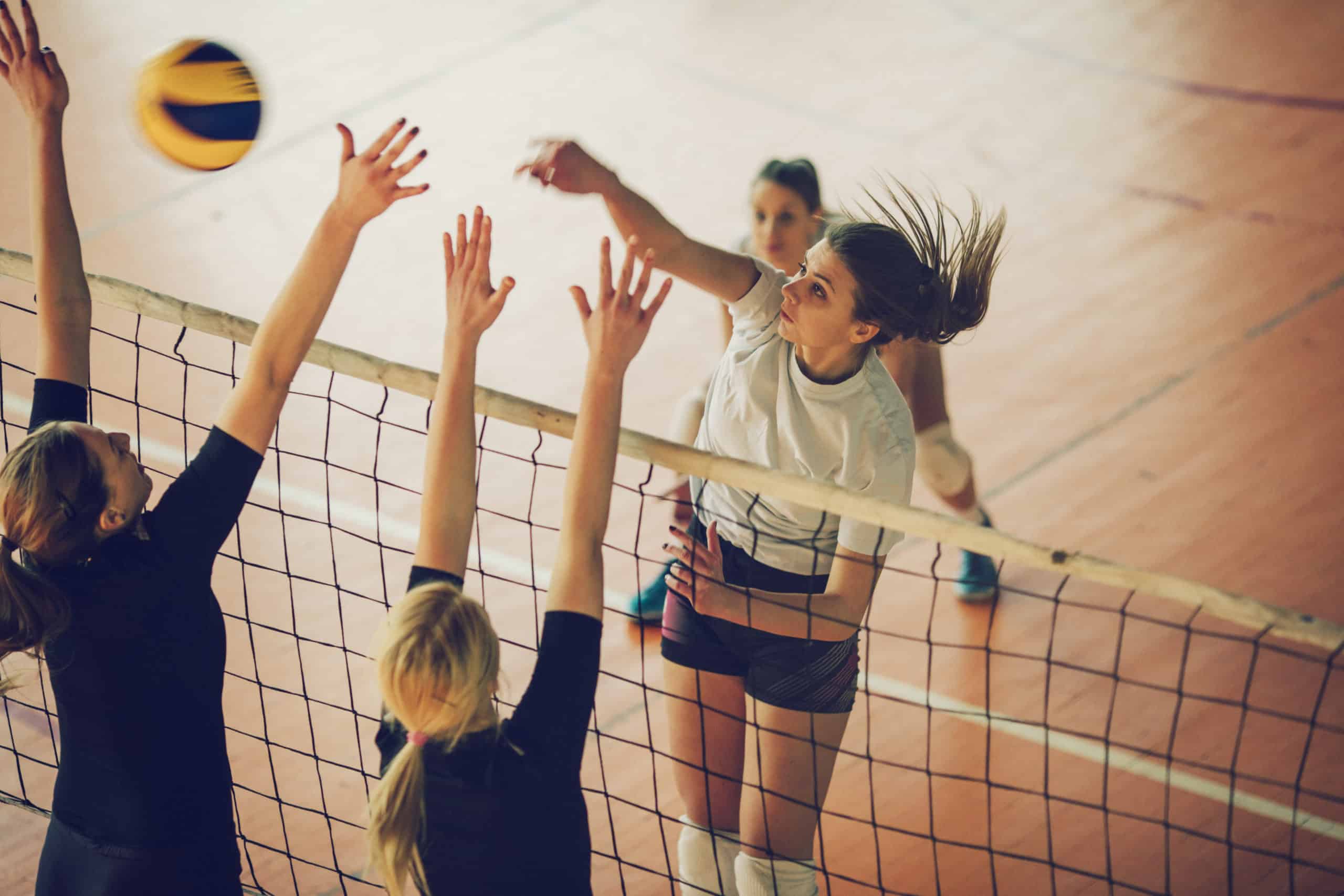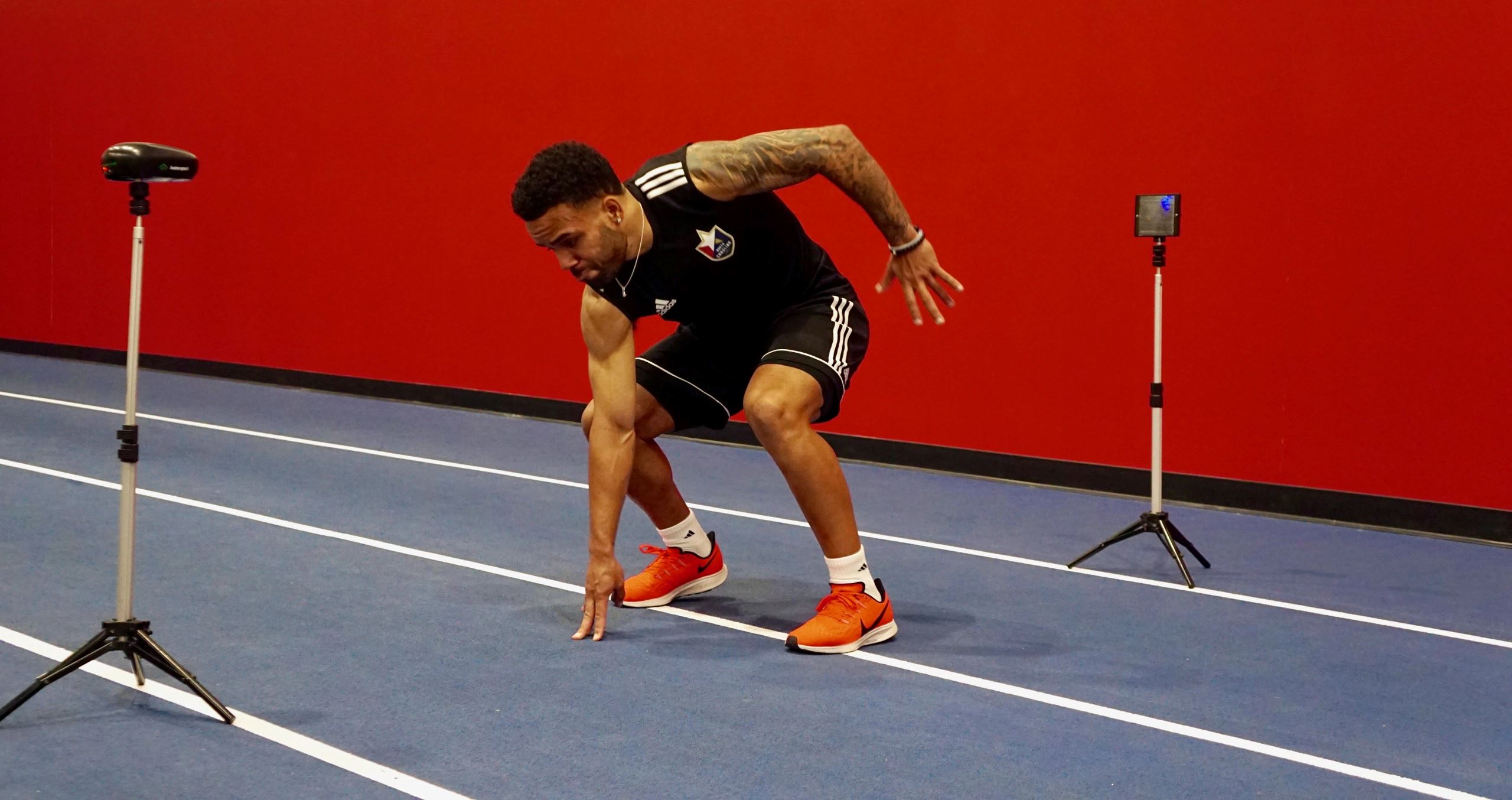Home>Misc>Featured>Why Is Volleyball Considered To Be A Good Aerobic Exercise


Featured
Why Is Volleyball Considered To Be A Good Aerobic Exercise
Published: October 2, 2023
Discover why volleyball is considered a featured aerobic exercise, offering numerous health benefits for both physical fitness and cardiovascular endurance.
Introduction
Welcome to the exciting world of volleyball, where thrilling dives, powerful serves, and intense rallies keep players and spectators alike captivated. But did you know that volleyball is not just a fun sport to play and watch? It is also a fantastic aerobic exercise that offers numerous health benefits.
Volleyball is a team sport played on a rectangular court, with two teams of six players each. The objective of the game is to score points by hitting the ball over the net and into the opponent’s court, while preventing the opposing team from doing the same. It requires a combination of skill, strategy, coordination, speed, and endurance.
Aerobic exercise refers to activities that require a continuous rhythmic movement, such as running, swimming, or cycling, and increase the heart rate and respiratory rate. These exercises help improve cardiovascular health, strengthen muscles, and boost overall fitness levels.
Now, you might be wondering why volleyball, with its short bursts of explosive movements, is considered a good aerobic exercise. Well, let’s delve deeper into the benefits of aerobic exercise and see how volleyball checks all the boxes.
Definition of Volleyball
Volleyball is a popular team sport played on a rectangular court, divided by a net. The objective of the game is for each team to send the ball over the net and into the opponent’s court, while also trying to prevent the opposing team from doing the same. The game is played with six players on each side, and points are scored by successfully landing the ball in the opponent’s court or when the opposing team commits a fault.
Volleyball requires a combination of skill, agility, teamwork, and strategy. Players must possess excellent hand-eye coordination to pass, set, and spike the ball effectively. They must also have good judgment and anticipation to quickly react and position themselves to receive and respond to the opponent’s attacks. The fast-paced nature of the game makes it thrilling and keeps the players engaged throughout.
Volleyball can be played both indoors and outdoors, with slight variations in the rules and court dimensions between the two settings. Indoor volleyball is typically played on a hard court, while beach volleyball is played on sand.
The origins of volleyball can be traced back to the late 19th century when William G. Morgan, a physical education director, created the game as a less strenuous alternative to basketball. Originally called “Mintonette,” the game quickly gained popularity and evolved into the modern-day sport of volleyball.
Today, volleyball is recognized globally and is played at various levels, from recreational leagues to competitive tournaments. It showcases the athleticism and teamwork of the players, making it a thrilling and enjoyable sport to participate in and watch.
Benefits of Aerobic Exercise
Aerobic exercise, also known as cardio exercise, plays a crucial role in maintaining overall health and well-being. It offers a wide range of benefits for both physical and mental health. Let’s explore some of the key advantages of incorporating aerobic exercise into your routine:
- Improved Cardiovascular Health: Aerobic exercises like volleyball increase your heart rate, which strengthens the heart muscle and improves its efficiency. It also helps to lower blood pressure, reduce the risk of heart disease, and improve overall cardiovascular health.
- Weight Management: Regular aerobic exercise helps burn calories and aids in weight loss. It boosts metabolism and helps maintain a healthy body weight by shedding excess fat and building lean muscle mass.
- Increased Energy Levels: Engaging in aerobic activities stimulates the release of endorphins, which are known as “feel-good” hormones. These endorphins help boost energy levels, reduce fatigue, and improve overall mood and productivity.
- Stronger Immune System: Regular aerobic exercise can strengthen the immune system, making you less susceptible to common illnesses like colds and flu. It enhances the production of white blood cells and antibodies, which help fight off infections and diseases.
- Improved Mental Health: Aerobic exercise has a positive impact on mental well-being. It helps reduce stress, anxiety, and symptoms of depression. Physical activity stimulates the release of serotonin, dopamine, and norepinephrine, which are neurotransmitters that promote feelings of happiness and reduce the risk of mental health disorders.
- Better Sleep: Engaging in regular aerobic exercise can improve the quality and duration of sleep. It helps regulate sleep patterns, reduces insomnia, and promotes a deeper, more restful sleep.
These are just a few examples of the many benefits of aerobic exercise. Whether you choose volleyball or any other form of cardio workout, incorporating regular aerobic exercise into your routine can have a profound impact on your overall health and well-being.
Volleyball as an Aerobic Exercise
While you may associate aerobic exercises with activities like running or cycling, volleyball is also an excellent form of aerobic exercise. Here’s why:
Continuous Movement: Volleyball involves constant movement, with players running, jumping, and diving to keep the ball in play. The rhythmic nature of the game keeps the heart rate elevated, making it a great aerobic workout.
Interval Training: Volleyball combines short bursts of intense activity with brief periods of rest. The explosive movements during spikes, blocks, and dives followed by moments of transition provide an interval-style workout that challenges the cardiovascular system.
Full-Body Workout: Volleyball engages multiple muscle groups throughout the body, including the legs, core, arms, and shoulders. Players constantly use their lower body for jumping and lunging, while their upper body is involved in hitting, passing, and setting the ball. This comprehensive muscle engagement leads to improved strength and endurance.
Improved Endurance: The continuous movement and quick reflexes required in volleyball help to build endurance over time. Regular play improves lung capacity, allowing players to sustain activity for longer periods without fatigue.
Enhanced Balance and Coordination: Volleyball demands excellent balance and coordination to perform specific movements and maintain stability while executing skills. The constant changes in direction and quick reaction times improve proprioception and overall body coordination.
Calorie Burning: Volleyball is a physically demanding sport that burns calories effectively. The combination of aerobic activity and muscle engagement results in increased calorie expenditure, making it a great choice for weight management.
Lower Impact: Compared to high-impact exercises like running, volleyball is a lower-impact sport that puts less strain on the joints. This makes it a suitable aerobic option for individuals who may have joint issues or prefer a lower-impact workout.
Volleyball offers all the benefits of aerobic exercise while providing the excitement and competitive spirit of a team sport. It’s a fun and engaging way to improve fitness levels and enjoy the numerous physical and mental health benefits that come with regular aerobic activity.
Cardiovascular Benefits
Engaging in regular cardiovascular exercise, such as volleyball, brings about a host of benefits for your heart and circulatory system. Here are some of the key cardiovascular benefits that volleyball can provide:
- Improved Heart Health: Volleyball is a dynamic and fast-paced sport that requires continuous movement, which elevates your heart rate. As your heart works harder during gameplay, it becomes stronger and more efficient over time. This increased heart strength leads to improved blood circulation and lower resting heart rate.
- Lowered Blood Pressure: Regular aerobic exercise like volleyball has been shown to reduce blood pressure levels, benefiting overall cardiovascular health. As you exercise, the blood vessels dilate, allowing blood to flow more freely through the arteries, resulting in lower blood pressure.
- Reduced Risk of Heart Disease: Engaging in regular aerobic activity, such as volleyball, can significantly reduce the risk of developing heart disease. This includes conditions like coronary artery disease, high cholesterol, and atherosclerosis. The increased heart health and improved circulation associated with volleyball contribute to a healthier cardiovascular system.
- Improved Blood Lipid Profile: Playing volleyball can positively impact your blood lipid profile by increasing good cholesterol (HDL) levels and decreasing bad cholesterol (LDL) levels. This change in lipid profile reduces the risk of plaque formation in the arteries and lowers the chances of developing heart-related issues.
- Enhanced Oxygen Utilization: Volleyball improves your body’s ability to utilize oxygen efficiently. During play, your muscles require more oxygen to perform at their best. Over time, regular volleyball sessions lead to improved oxygen uptake and utilization by the body, resulting in increased endurance and improved overall cardiovascular fitness.
- Weight Management: Volleyball is an effective calorie-burning exercise that can aid in weight management. Excess weight can put additional strain on the heart and increase the risk of cardiovascular complications. By incorporating volleyball into your routine, you can burn calories, shed excess fat, and maintain a healthy weight, reducing the burden on your cardiovascular system.
Volleyball’s cardiovascular benefits go far beyond the thrilling gameplay. By playing regularly, you can improve heart health, lower blood pressure, reduce the risk of heart disease, and enhance overall cardiovascular fitness. Make volleyball a part of your fitness routine to enjoy these incredible cardiovascular benefits.
Muscle Engagement and Strength Building
Volleyball offers a comprehensive workout for your entire body, engaging various muscle groups and contributing to overall strength building. Let’s explore how playing volleyball can help you develop and strengthen different muscles:
- Leg Muscles: Volleyball involves constant movements such as jumping, lunging, and squatting, which primarily work the leg muscles. The quadriceps, hamstrings, calves, and glutes are all engaged during these actions, helping to build strength and power in the lower body.
- Core Muscles: A strong core is crucial for stability, balance, and efficient movement on the volleyball court. In order to maintain proper posture, execute accurate passes, and generate power for hits, your core muscles including the abdominals, obliques, and lower back are actively engaged. Regular gameplay can lead to improved core strength and stability.
- Shoulder and Arm Muscles: Volleyball requires frequent overhead motions for serving, spiking, and blocking. These actions engage the muscles in the arms, shoulders, and upper back, including the deltoids, triceps, biceps, and rotator cuff muscles. Regular volleyball play can lead to significant gains in upper body strength and muscular endurance.
- Back Muscles: The back muscles, including the trapezius, rhomboids, and erector spinae, play an important role in stabilizing the spine and maintaining proper posture during gameplay. This is especially evident during actions such as jumping and diving, where the back muscles are actively engaged to support the body’s movements.
- Hand and Forearm Muscles: Volleyball requires precise ball control, which involves gripping, passing, and setting the ball. The muscles of the hands, wrists, and forearms are continuously engaged during these actions. Over time, these muscles strengthen, enhancing ball-handling skills and improving overall hand-eye coordination.
With each pass, set, spike, or block, volleyball challenges and strengthens various muscle groups throughout the body. Regular play not only improves muscle strength and endurance but also enhances overall athleticism and physical performance. Whether you’re a beginner or an experienced player, volleyball offers a dynamic and effective way to engage and strengthen your muscles.
Improved Coordination and Agility
Volleyball is a sport that demands excellent coordination and agility. The constant movement, quick reactions, and split-second decision-making required in the game contribute to improving these essential skills. Let’s explore how playing volleyball can enhance coordination and agility:
- Hand-Eye Coordination: Volleyball involves precise hand movements and timing when passing, setting, and hitting the ball. The players must coordinate their hand movements with their visual perception to execute accurate plays. Regular practice improves hand-eye coordination, allowing players to anticipate the ball’s trajectory and make split-second adjustments.
- Footwork: Volleyball requires quick and precise footwork, especially when transitioning from one position to another or moving to make a play. The ability to move efficiently and maintain proper foot positioning is crucial for maintaining balance and executing skills effectively. Regular gameplay enhances footwork and agility.
- Reaction Time: Volleyball is a fast-paced sport that demands quick reactions. Players must react instantly to the movement of the ball, the actions of their opponents, and the positioning of their teammates. By continually practicing and playing volleyball, reaction time improves, allowing players to respond more swiftly and effectively on the court.
- Spatial Awareness: Volleyball requires players to have a keen sense of spatial awareness, understanding the position of the ball, their teammates, and the opponents. This awareness allows players to move quickly and efficiently, avoiding collisions and maximizing their ability to make plays.
- Balance and Stability: Playing volleyball requires players to maintain proper balance and stability in various positions, including jumping, blocking, and landing after a spike. As players continuously work on these movements, their ability to maintain balance and stability improves, enhancing overall coordination and agility.
- Timing and Anticipation: Volleyball demands precise timing and anticipation. Players must anticipate the movement of the ball, the actions of their opponents, and the positioning of their teammates to make effective plays. By consistently playing volleyball, players develop a better sense of timing and anticipation, allowing them to make accurate passes, sets, and hits.
Volleyball is a sport that constantly challenges coordination, agility, and spatial awareness. By regularly participating in volleyball, players can enhance these skills, leading to improved performance not only in the game but also in other daily activities that require coordination and agility. So grab a ball, gather your teammates, and enjoy the benefits of improved coordination and agility through the exciting game of volleyball.
Weight Loss and Body Toning
Volleyball is not only a thrilling sport but also an effective form of exercise for weight loss and body toning. Combining aerobic activity with muscle engagement, volleyball can help you achieve your fitness goals. Here’s how playing volleyball can contribute to weight loss and body toning:
- Calorie Burn: Volleyball is a physically demanding sport that requires constant movement, explosive jumps, and quick lateral movements. This high-intensity activity results in a significant calorie burn. By playing volleyball regularly, you can create a calorie deficit, which is essential for weight loss.
- Cardiovascular Workout: Volleyball is an aerobic activity that increases your heart rate and causes you to breathe harder. It improves cardiovascular fitness and helps you expend calories. The continuous movement and interval-style gameplay keep you engaged, making it an enjoyable way to burn calories and contribute to weight loss.
- Full-Body Engagement: Volleyball engages multiple muscle groups throughout the body. The jumping, lunging, and diving movements work the leg muscles, while the hitting, passing, and blocking actions engage the upper body, including the arms, shoulders, and core. This comprehensive muscle engagement helps tone and strengthen the body.
- Muscle Toning: As you play volleyball, your muscles work against resistance, which helps to tone and define them. The repeated jumps and powerful hits stimulate muscle growth and development. With consistent play, you can achieve lean and toned muscles, especially in the lower body, core, and upper body areas.
- Improved Body Composition: Regular volleyball play helps improve body composition by reducing body fat and increasing muscle mass. While body weight may not change significantly, the reduction in body fat and increase in muscle tone result in a leaner body with improved definition.
- Increased Metabolism: Playing volleyball regularly can boost your metabolism, even after your workout is over. The intense physical activity stimulates the body’s metabolic rate, allowing you to burn calories at a higher rate throughout the day.
- Functional Strength: Unlike some other forms of exercise, volleyball involves dynamic movements that mimic real-life activities. The strength gained from playing volleyball translates into improved functional fitness, making daily activities easier and reducing the risk of injury.
Through its combination of cardiovascular exercise, muscle engagement, and calorie burn, volleyball can be an effective tool for weight loss and body toning. The competitive nature of the sport keeps you motivated and engaged, making it a fun and rewarding way to achieve your fitness goals.
Mental Health Benefits
While volleyball is predominantly a physical activity, it also offers remarkable mental health benefits. Engaging in regular volleyball play can have a positive impact on your overall well-being and mental state. Let’s explore some of the mental health benefits that come with playing volleyball:
- Stress Relief: Volleyball provides an excellent outlet for stress relief. The fast-paced nature of the game, combined with the focus required to anticipate and react to the ball, helps divert your attention from daily stressors and promotes relaxation.
- Mood Boost: Physical exercise, including volleyball, stimulates the release of endorphins, commonly referred to as “feel-good” hormones. These endorphins enhance mood, reduce feelings of anxiety and depression, and promote a sense of well-being.
- Improved Cognitive Function: Regular aerobic exercise, such as playing volleyball, has been shown to improve cognitive function and enhance brain health. It boosts blood flow and oxygen delivery to the brain, which can enhance memory, concentration, and overall cognitive performance.
- Enhanced Self-Confidence: Playing volleyball offers opportunities for personal growth and achievement. As you improve your skills, make successful plays, and contribute to the team’s success, your self-confidence and self-esteem improve. This newfound confidence can extend beyond the volleyball court and positively impact various areas of your life.
- Social Interaction: Volleyball is a team sport that promotes social interaction and fosters a sense of belonging. Joining a volleyball team or participating in recreational leagues allows you to connect with others who share a similar interest. This social interaction can help combat feelings of loneliness and isolation, contributing to improved mental well-being.
- Improved Stress Management: Volleyball presents a variety of challenges, both individually and as a team. As you navigate these challenges and learn to manage stress on the court, you develop valuable skills in stress management that can be applied to other areas of your life.
- Fun and Enjoyment: Perhaps one of the most essential mental health benefits of volleyball is the sheer enjoyment and fun it provides. Engaging in an activity that brings joy and excitement can have a significant impact on mental well-being, promoting a positive outlook and reducing negative emotions.
Playing volleyball not only strengthens your physical fitness but also enhances your mental well-being. By incorporating regular volleyball sessions into your routine, you can experience the mental health benefits of stress relief, mood enhancement, improved cognitive function, increased self-confidence, and social interaction. So grab a ball, join a team, and enjoy the mental health benefits that come with this exhilarating sport.
Tips for Incorporating Volleyball into Your Exercise Routine
If you’re interested in incorporating volleyball into your exercise routine, here are some helpful tips to get you started:
- Find a Local Group or League: Look for local volleyball groups or leagues in your area. Joining a team or participating in recreational leagues provides regular opportunities to play and practice volleyball, ensuring consistent engagement in the sport.
- Practice Basic Skills: Begin by practicing basic volleyball skills such as passing, setting, and serving. Working on these fundamental skills will help build a foundation and improve your overall performance.
- Join a Club or Gym: Consider joining a volleyball club or a gym that offers volleyball facilities. These establishments often have scheduled games and training sessions, providing a structured environment for playing and practicing volleyball.
- Warm-Up and Stretch: Before starting any volleyball session, make sure to warm up and stretch. Engaging in dynamic warm-up exercises and performing stretching routines reduces the risk of injury and prepares your body for the physical demands of the game.
- Play with Different Skill Levels: Don’t be afraid to play with people of different skill levels. Playing with more experienced players can challenge you to improve your skills, while playing with beginners allows you to practice and develop your technique.
- Mix Up Your Routine: Vary your volleyball routine to keep it exciting and prevent stale workouts. Switch between playing indoor and beach volleyball, participate in tournaments, or try different game formats such as doubles or triples. Mixing up your routine will help maintain your motivation and engagement in the sport.
- Set Specific Goals: Set specific goals to work towards in your volleyball practice. Whether it’s improving your serving accuracy, increasing jump height, or perfecting a specific skill, having goals can help you stay focused and track your progress.
- Stay Consistent: Consistency is key when incorporating volleyball into your exercise routine. Aim for regular play or practice sessions to make significant improvements in your skills and fitness level. Whether it’s once a week or multiple times, establish a schedule that works for you.
- Stay Hydrated: Volleyball is a physically demanding sport, so make sure to stay hydrated before, during, and after your sessions. Drink plenty of water to maintain proper hydration, especially during long and intense games.
- Listen to Your Body: Pay attention to your body and listen to its signals. Take breaks when needed, especially if you experience fatigue or discomfort. Rest and recovery are important to prevent overexertion and injuries.
Incorporating volleyball into your exercise routine can bring a new level of enjoyment and physical activity to your life. By following these tips, you can start playing regularly, improve your skills, and experience the many health and fitness benefits that volleyball has to offer.
Conclusion
Volleyball is not just a game; it is a fantastic aerobic exercise that brings numerous physical and mental health benefits. The continuous movement, interval-style gameplay, and full-body engagement make volleyball an effective way to improve cardiovascular health, build strength, enhance coordination and agility, aid in weight loss and body toning, and boost mental well-being.
Engaging in regular volleyball play provides a dynamic and enjoyable way to incorporate aerobic exercise into your routine. Whether you join a team, participate in recreational leagues, or simply play with friends, volleyball offers a multitude of opportunities to challenge yourself physically and mentally while having fun.
Remember to consider tips like finding a local group or league, practicing basic skills, staying consistent, and setting specific goals to make the most out of your volleyball experience. Keep in mind the importance of warming up, staying hydrated, and listening to your body to prevent injury and maximize your performance.
So, if you’re looking for an exciting sport that offers a complete workout and brings joy to your life, consider volleyball. Take advantage of its cardiovascular benefits, muscle engagement, improved coordination and agility, weight loss potential, body toning capabilities, and the mental health rewards it provides.
Grab a ball, gather your teammates, hit the court, and enjoy the countless benefits that volleyball has to offer. Start your journey towards a healthier, fitter, and more confident you through the power of volleyball.




